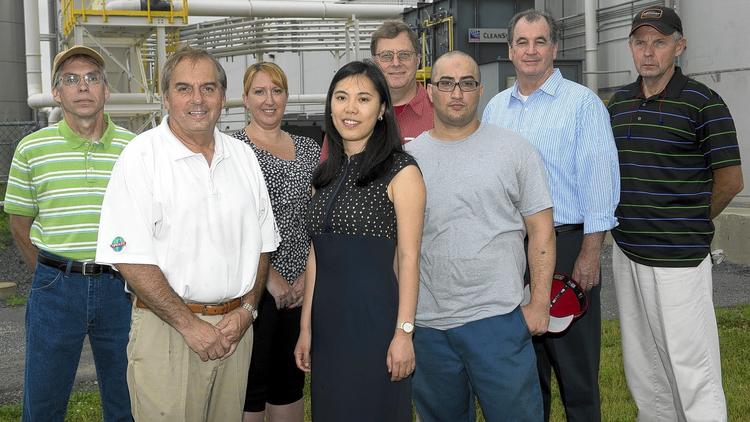
The onset of the Great Recession might not seem like the ideal time to launch a manufacturing business.
But that’s exactly what Christina Wong did, and today her business — Ecopax in Forks Township, maker of single-use, take-out food containers — has a 175,000-square-foot factory that runs day and night, seven days a week, employing about 75 workers.
On the one hand, Ecopax’s story bucks the trend. Manufacturing employment is on the decline both nationally and statewide.
But on the other hand, it perfectly illustrates what’s happening in the Lehigh Valley. The region’s access to distribution networks and proximity to customers have given Ecopax a critical advantage in a highly competitive industry.
Original article by
“Speed sets you apart,” said Wong, who is 32 and lives in nearby Palmer Township.
Wong, whose title is vice president of operations, is part owner of Ecopax. Though she studied neuroscience at Stony Brook University on Long Island, she has learned the plastics business from her father, Peter Wong.
“I always knew I would be in the family business,” she said. “It’s in the blood.”
Peter Wong emigrated from China, settling in Brooklyn, in 1994. Four years later, he launched United Plastics Group in Somerset, N.J.
“He is the visionary, the strategist,” she said.
In a sense, Ecopax is an extension of United Plastics; both companies make disposable polystyrene foam “clam shell” containers and other food packaging. The Wongs, though, established the two as separate businesses.
Christina Wong moved to the Lehigh Valley in 2007 to oversee construction of the Ecopax factory. By 2009, the business had a dozen employees, and it would soon need many more.
Ecopax was quickly carving out a niche for itself in an established industry dominated by a number of much bigger, international manufacturers such as Pactiv and Dart Container.
There have been some hiccups along the way: a $57,000 fine in 2011 for worker health and safety violations, and a $190,000 fine in 2013 for air quality violations.
Wong said Ecopax has learned from its mistakes.
She attributes the company’s rapid growth in part to its ability to customize its products to meet customers’ individual needs, and in part to its location — in a business-friendly, centrally located region.
The bulk of Ecopax’s business, it turns out, is not with the restaurants that use its products, but with distributors that have warehouses either in or not too far from the Lehigh Valley.
For any business that makes bulk products with low profit margins, proximity to customers — which translates into lower transportation costs — can be the difference between profit and loss. Indeed, so important is proximity that Taizhou Fuling Plastics, a Chinese company that makes plastic cutlery, announced in May it would build an 88,000-square-foot manufacturing facility in the Iron Run Industrial Park in Fogelsville.
“If you’re going to distribute from here, it can be even more cost-effective to make it and distribute it here,” explained Lehigh Valley Economic Development Corp. CEO Don Cunningham. “The Lehigh Valley is in the sweet spot,” situated within a day’s drive of tens of millions of consumers in the country’s most densely populated corridor.
Though the recession is over, manufacturing employment continues to decline.
On Friday, the Pennsylvania Department of Labor and Industry released statewide employment data for June. Manufacturing employment was down 1 percent from a year before.
Some jobs have been shipped overseas to countries with lower labor costs, and others have been lost to automation as robots do what was once done by the human hand.
Ecopax, meanwhile, is looking to hire. It has 10 openings, including two management positions.
Last year, the company completed a $3.7 million expansion, adding 75,000 square feet to its existing 100,000-square-foot facility, plus six new storage silos, bringing the total to eight.
The factory is churning out more product than ever. Machines continuously stamp clam shells out of huge rolls of polystyrene foam. All scrap is collected and recycled into new rolls. Nothing is wasted. The floor is spotless.
Cunningham put Ecopax’s annual revenues in the range of $25 million to $30 million. (A private company, Ecopax does not disclose financial information.)
In a relatively short amount of time, Ecopax has put down deep roots in the Lehigh Valley. And, Wong said, so has she.
“It’s a good place to live, to play and to work,” she said. “I call this home now.”


